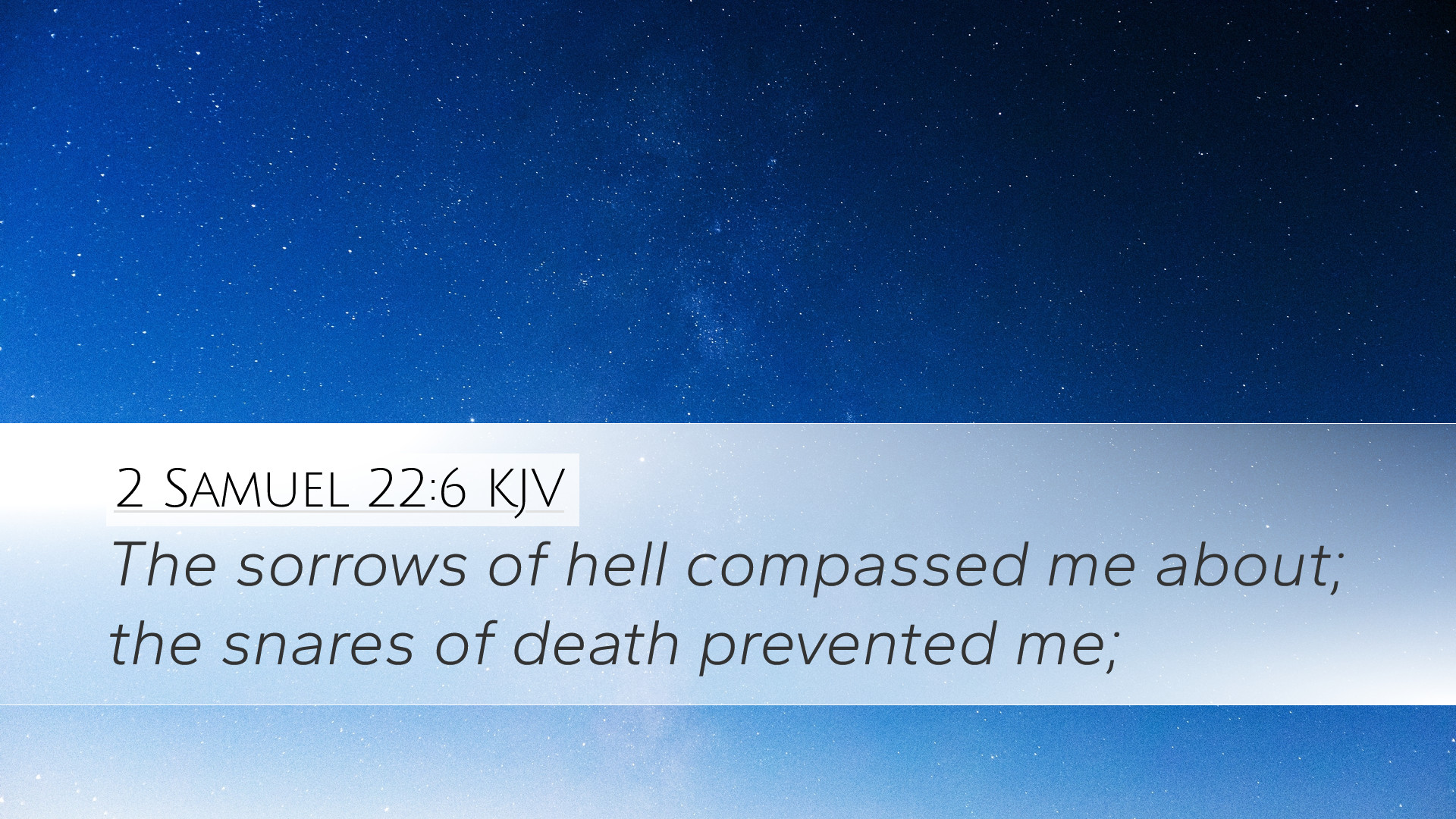Commentary on 2 Samuel 22:6
2 Samuel 22:6 states: "The sorrows of hell compassed me about; the snares of death prevented me."
Introduction
This verse is part of a larger song of thanksgiving offered by David, celebrating God's deliverance from his enemies. It is significant in capturing the intensity of David's sufferings and his ultimate reliance on God for salvation. Commentaries from esteemed theologians provide rich insights into the theological and contextual implications of this passage.
Contextual Overview
David composed this song at a point in his life when he had faced severe trials, particularly during his flight from Saul and later during the rebellion of Absalom. Understanding the historical and emotional backdrop of this verse is crucial to appreciate its depth.
Historical Context
- The verse reflects David's perception of his perilous situation, feeling as though he was surrounded by unyielding danger.
- It follows a series of conflicts in David's life, emphasizing his human vulnerability and desperate need for divine intervention.
Thematic Insights
This verse embodies central themes of suffering, divine rescue, and the reality of death, which resonate deeply throughout scripture.
Suffering and Distress
David's declaration, "The sorrows of hell compassed me about," suggests an overwhelming sense of despair. Matthew Henry comments on this by highlighting the metaphor of hell here representing the grave or the state of hopelessness from which one cannot escape.
Death and Deliverance
The phrase "the snares of death prevented me" indicates unexpected traps laid by death itself. Albert Barnes notes that this imagery portrays death as a cunning hunter, seeking to ensnare David at his most vulnerable moments. David acknowledges the threat of death while simultaneously affirming his faith in God as his deliverer.
Interpreting 'Hell' and 'Death'
The Hebrew Understanding
The term used for "hell" is Sheol, which in ancient Hebrew culture referred to the realm of the dead, not necessarily a place of eternal torment as later theological interpretations might suggest. Adam Clarke elaborates that it speaks to the somber reality of life after death, a place where the living feel isolated from God.
The Nature of Sin and Death
This verse also reflects on the broader biblical anthropology regarding sin's role in bringing death into the world. Both Clarke and Barnes discuss how sin leads to spiritual mourning, and the awareness of impending death breeds even greater sorrow.
Theological Reflections
God as the Ultimate Deliverer
Despite the dire imagery, the entirety of this chapter ultimately focuses on God’s sovereignty and His ability to save. David recounts instances of divine assistance—proving that while the threats from sin and death are real, God’s power is greater.
The Voice of the Redeemed
This passage serves as a powerful reminder of the voice of the redeemed, echoing the sentiments of those who have come to recognize their own weaknesses, yet find strength in God’s promises. Henry emphasizes that such acknowledgments lead to a deeper relationship with the Lord, marked by trust and reliance on His grace.
Practical Applications
For pastors, students, and scholars, this verse invites reflection on the nature of human suffering and God’s providence. Here are some practical applications:
- Encouragement in Suffering: Believers are encouraged to express their sorrows to God, who hears and responds.
- The Importance of Prayer: Just as David cried out to God amidst peril, so too should individuals engage in earnest prayer during distress.
- Hope in Deliverance: This passage can be used to instill hope in congregations, reminding them that evil and death do not have the final say—God does.
Conclusion
2 Samuel 22:6 serves as a profound declaration of both the reality of human despair and the assurance of divine salvation. The insights from Matthew Henry, Albert Barnes, and Adam Clarke converge to highlight the significance of trust in God amidst life's uncertainties. This commentary aims to offer a deeper understanding of the verse for contemporary readers, providing theological, historical, and practical insights vital for pastoral care, scholarly study, and personal growth in faith.


